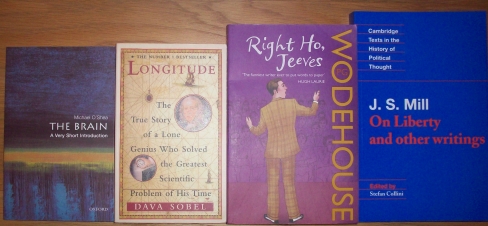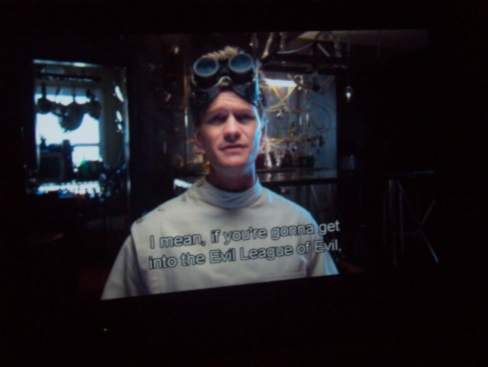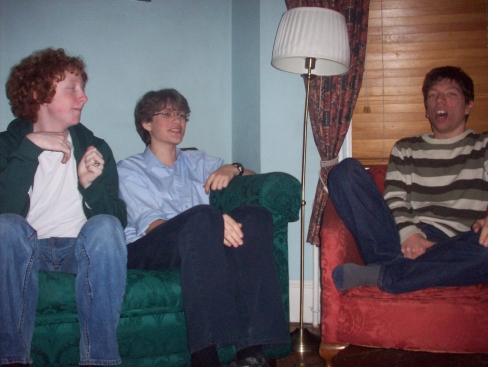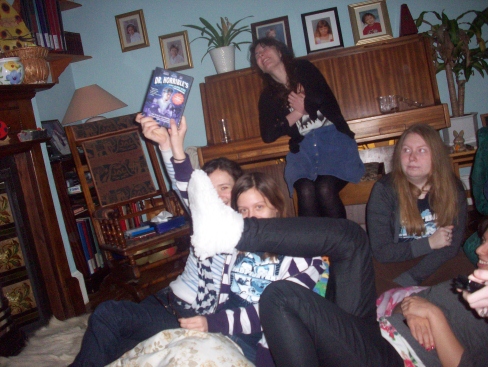Eek: pre-travelling stress! An amorphous mass of ‘things’ have somehow (praise her holy hooves!) been miniatured and crammed into the backpack, but it’s anyone’s guess whether they will turn out to be remotely useful things, or whether I’ll ever be able to get them out again if they are, or whether if I do get them out again I’ll ever be able to cram them in again, or whether my American relatives will take one look at clothes that are composed largely of creases and disown me with disdain, and omg what on earth am I going to do with my coat when I reach California and grr I haven’t even chosen which books to take yet and crikey it might be a really good idea to check if I have any money in my account before leaving… stress.
All of which means I am unable to do justice to the SFX Weekender I’ve just come back from with Abbi, Paul and David – although luckily Abbi has already blogged in her usual masterly style. So you’ll never get to hear (at least not yet!) about mumbling lame words of star-struck gratitude to poor Steven Moffat, or the unique social history museum that is Pontin’s, or the wide range of films we enjoyed – from the laugh-out-loud terrible Skyline to the laugh-out-loud inspired Scott Pilgrim vs. the World to the really rather effective Monsters. But I will say just one thing. Until this weekend, I had never before left a party with a strange sense of being insufficiently geeky to properly fit in. If I wasn’t so busy, I expect this would trigger an identity crisis of sorts… ![]()

And for my first adventure, a trip back in time to the 1950s!
So, today Tash K and I went on a fact-finding mission to a local homoeopathy shop, Because We Can And Who’s Going To Stop Us (TM). Technically, it actually stocks a rather full and complete range of bullshit, along with some wholly unobjectionable items including marmalade, waffles and a rather tasty looking ginger cake. (Never say we’re not fair.) But it was the homoeopathy we were most interested in, so we lingered around the aisle whilst waiting for the talkative advisor woman to be free.
Took a while. Y’see, it turns out that in alternative-world you do your detailed patient consultations seated on chairs in the middle of the shop, presumably so that anyone who’s interested can eavesdrop. So we listened in, naturally, and – I kid you not – some of this conversation would get rejected from a sketch on dumb middle-class preoccupations for being too unrealistic. The woman was clearly fine, disregarding her obsession with eliminating salt from her diet and once eating “some dodgy hummus”. And yet all sorts of mental effort were being wasted on collating and disseminating such novel wisdom as “y’know, I was told that if you fast for two days, your body actually starts to break down bacteria for food, destroying it”. Mmm, tasty bacteria waffles.
Anyway, once Hummus Girl was finally done, we had a chance to corner her advisor. Sadly, she didn’t seem very keen in chatting, since as a ‘nutritionist’ all she could really say was that homoeopathy was a totally different kettle of watery fish altogether. Oh, but that it involved ‘vibrational energies of the organs’ and cured ‘like with like’. “But this booklet suggests remedies for bereavement,” I persisted, “how can you dilute a little piece of ‘someone dying’?” Sensible answers were not forthcoming.
There is a serious point underneath all of this fun, and that is how we’ve got into a position where human beings are gleefully selling other human beings expensive sugar pills to combat problems as serious as bulimia or anorexia. (I take rather personal offence, incidentally, to the labelling of anorexia as ‘loss of appetite’.) This is inexcusable. And furthermore, is there not an overload of irony in the constant invocation of ‘nature’ in these people’s products? The lazy criticism of ‘conventional’ (‘actual’) medicine is that it eschews ‘holistic’ remedies for a cocktail of drugs with nasty side effects. And yet here, in this shop, there was a bottle of vitamin pills – inexplicably shielded with a UV filter – labelled ‘positive thinking’. This is as artificial as you could ever hope to get: a whole state of mind reduced to a pricey glass bottle. How stunningly pathetic.
When it comes to mental health, incidentally, the whole beauty of science lies in the acknowledgement that we start from great ignorance. I’ve never heard of anyone – aside, perhaps, from the most unscrupulous of pharmaceutical sources – who believes that antidepressants offer a simple ‘cure’ to depression today. For heaven’s sake, we don’t even know very much about how the brain functions ‘normally’ yet, let alone to be in a position to start ‘fixing’ it. You can see where the space opens up for quacks to peddle the ‘well then, what have you got to lose by trying something else?’ line, or others to complain that it’s all hopeless and we would be better off seeking solace in spirituality instead. Nonsense. Future generations will hopefully be as appalled by our mental health as we are today by the physical hardship of the past (or, indeed, poorer parts of the world today). But we will only get from here to there via the same quiet empiricism which our predecessors used to gift us an end to plague, smallpox and polio. And I’ll take that over sugar pills any day.
Have spent the past couple of days saying farewell to little groups here and there: a Science Museum Lates evening last Wednesday, a delightfully lazy afternoon in the pub with Joshua on Friday and then News Revue plus wine plus sleepover (the word is still cute!) with Matt and Caroline on Friday night. My grandparents were over on Sunday – the only time when this family ever really has ‘tea’ as a proper afternoon all-encompassing meal – and then I joined Charlotte Speechley to (finally!) see The King’s Speech in the evening.
So a couple of things about this.
Point one, I’m still a republican at heart. Can’t not be. ‘At heart’, of course, doesn’t prevent me from feeling – most of the time – that we’d probably be better off not fiddling with the monarchy in case we do something worse.
Point one and a half, I don’t think this is really relevant to the film at all. It’s just a supremely well-acted human drama, and that’s what I enjoyed it for.
However!
Point two, why is it that showing newsreel footage of Hitler in a darkened cinema for a couple of seconds still makes my spine tingle? Nazis, overexposed as they perpetually are, still remain both fascinating and horrifying to me in a way that I find rather surprising. I mean, obviously, everyone is against Nazism, and there’s no need to prove your moral status by reasserting that all the time. But I really would hold nothing against anyone whose response to a clip of Hitler was as emotionally detached as it would likely be to any other clip of any other grim historical phenomenon. Why should it not be? Maybe coming straight from tea with grandparents who were actually forced to flee Nazism makes it different, but I suspect it’s more about images of Hitler being stamped onto our consciousness from a pretty young age as the ultimate embodiment of an evil regime. Whatever it is, it works.
(Bracketed point three, not sure I’ve ever had a one-to-one conversation with Speechley before, but she’s lovely. Whatever the lawnmower says.)
And finally, last night I was at Oliver’s with Abi and Sarah for dinner and further farewells. And a poem ![]() We concluded with the infamous Tool Academy but, surprisingly enough, came away thinking they were mostly rather sweet and good-natured folk. Too soft?
We concluded with the infamous Tool Academy but, surprisingly enough, came away thinking they were mostly rather sweet and good-natured folk. Too soft?
Had intended this post to be about homoeopathy, not Nazis, but since we are where we all I might continue with Operation Waterfight in another post…
So this is an experiment, inspired entirely by watching Tash this morning, at reviewing the books I’ve read during 2011 so far. My tastes are perhaps rather eccentric, so this may not be of much interest to anyone, but let’s give it a whirl. After all, since there are way too many interesting books to read in the world today, and far too little time to read anything at all, perhaps you can treat reading this review as sorta equivalent to actually having read these yourselves? Maybe?
Also, I’m putting off tidying my floor.

The Brain; Longitude; Right Ho, Jeeves; On Liberty and other writings
I’m rather addicted to the Very Short Introduction series even though I remember little of the detail after finishing, and thus the attempt to be more scientifically literate doesn’t always progress much. Still, the brain is fascinating enough to read about repeatedly, and this book helpfully devotes a decent chunk of time just trying to establish the basics of how neurons actually work. Frustratingly, of course, some of the bigger questions about how consciousness as a whole physically comes about remain largely unanswered, and I very much hope that I’ll be able to read an updated edition in 50 years’ time summarising our further leaps in understanding. In the meantime, this is a primer to the usual high standards of the Very Short Introductions, although not quite as ‘fun’ as the still-extraordinary Phantoms in the Brain. And you know you’re in safe hands with a book which stridently sets out the ‘purely material terms’ of the discussion in the very first paragraph: no messing about with spirituality here.
Longitude – Dava Sobel
I read this as part of my quest to finally get through some books which have been sitting on my shelf for years. The story of eighteenth century clockmaker John Harrison and his life’s work building clocks accurate enough to determine longitude at sea, its greatest attribute is stimulating an appreciation of just how many people in the past worked their little socks off in cumulatively bringing us to where we are today. I mean, this guy really did care about his clocks, and hats off to him for that. The tone is breezy and easy to read – certainly no bad thing – although the narrative quest for heroes and villains does result in a number of people trotted out to be the ‘bad guys’, thwarting our ‘lone genius’ out of jealousy or contempt or bitterness, who unfortunately don’t seem capable of much more serious villainy than perhaps keeping his clock in the sun for too long. Still, sometime it’s nice to read history on a human-scale, and this book won’t demand much of your time in return for making you a lot more knowledgeable about sea clocks.
Right Ho, Jeeves – P.G. Wodehouse
Sublime. I’d never read any Wodehouse before, nor seen any adaptations, but this has instantly converted me into a fan. I sense that some people are turned off by a book set entirely in an inter-war bubble of insufferably posh idiots. Wodehouse is consistently mocking, of course, but it’s certainly very ‘gentle’ (as my dad said a little dismissively) and inclined to leave you walking around for days muttering ‘tush!’ and ‘what ho!’ at the earliest opportunity. Is this inculcating a romantic attachment to a pretty unattractive world of, as previously mentioned, insufferably posh idiots? No, it isn’t. It’s just funny, OK? Beautifully written, wonderfully unstated and hilarious… give it a try, and leave the searing social critique for some other writer in some other book. Right ho, Jeeves!
On Liberty and other writings – J.S. Mill
Toby Young makes a habit of saying ridiculous things, but one of his more outlandish theories revolves around the learning of Latin being necessary because it ‘teaches you to think’ and ‘argue logically’ and ‘swim 200 metres backstroke’ and so on. It’s a shame, not only because it demeans Latin, but also because it implies that English is somehow deficient as a language of serious thought. Reading J.S. Mill might cure him of this illusion. There are three works included here: ‘On Liberty’ (1859), ‘The Subjection of Women’ (1869) and his posthumous drafts of ‘Chapters on Socialism’. Mill was progressive enough to render him immediately likeable to a modern audience, even if you don’t agree with everything he says, and his writing style smacks of a fair-minded consideration of the arguments melded together with passionate force in articulating what he believes. (The defence of freedom of speech in ‘On Liberty’ is particularly good.) I found the final ‘Chapters on Socialism’ the most interesting, actually, mostly because I think they would pass the ‘Saoirse test’: a discussion thoughtful enough not to prompt a metaphorical shot to the head. It was the following line from ‘On Liberty’, however, which had me beaming with nerdy political thought love:
“It is a piece of idle sentimentality that truth, merely as truth, has any inherent power denied to error, of prevailing against the dungeon and the stake.”

He’s got a PhD in horribleness

Probably mid-through an operatic solo

Dr. Horrible!
To steal from someone else’s tweet, today was absolutely glorky: gloriously dorky! Had a great bunch of people over to watch – and sing-along to – Dr. Horrible’s Sing-along Blog, which we followed up by watching it with the very special musical DVD commentary. Whilst eating mini-doughnuts. Is this not, y’know, the perfect life? Thanks to everyone who came ![]()
Nobody wants to be moooissst! *jazz hands*
Also! Lovely Camden night on Friday eve with Emma from my Special Subject class at uni. I do wonder how many jugs of sangria I’ve ordered from that bar now, but it’s always delicious…









